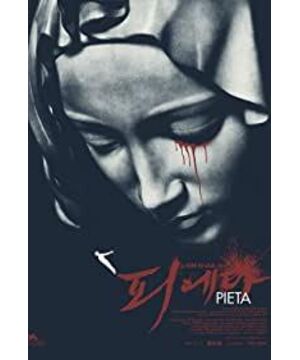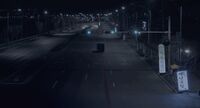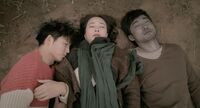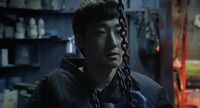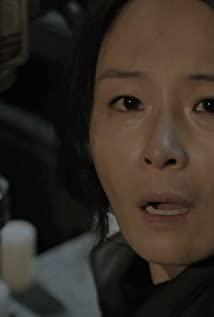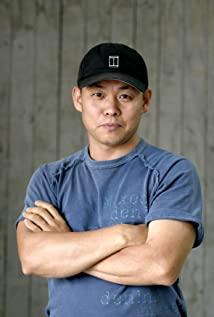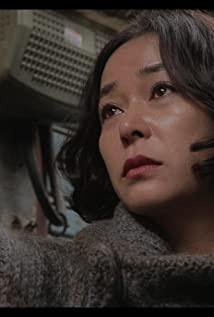The Pietà is derived from Michelangelo's "Mourning Christ". This work is based on the biblical story, showing the grief and mourning scene of the Virgin Mary picking up her son's body after Christ was taken down from the cross. In the poster of "Sorrow", the mother Jiang Meishan hugs her son Li Kangdao in this posture. "Through the gesture of the Virgin, I was deeply moved by the humanity contained in her sad and painful emotions." After winning the Golden Lion Award at the Venice Film Festival in 2012, Kim Ki-duk stated the reasons for his creation and the core of the film" mother and son". Kim Ki-duk's films have a strong religious atmosphere, and he tries to express life and humanity through religion. In this film, he expresses the theme of "redemption" in the name of the Christian story of the Holy Trinity.
The movie "Saint" was shot in the old industrial area of Seoul. Cheonggyecheon separates the prosperous area with high-rise buildings from the dilapidated and shabby industrial area. The gloomy and cold tones set the tone of the whole story. Mother Jiang Meishan embarked on the road of revenge after experiencing the pain of losing her son. She decided to "trial" the murderer of her son Xiangjiu, the debt collector Li Kangdao. For revenge, Jiang Meishan found Li Kangdao and claimed to be the mother who abandoned him many years ago. Kang Dao was extremely disgusted and rejected at first, but with his mother's repeated efforts and perseverance, Kang Dao began to soften and gradually accepted all this.
The camera is aimed at the loan sharks who are struggling to survive in the industrial zone. This kind of depression is radiated from everyone in the film - the disabled in a wheelchair and hanged on a hook, Li Kangdao, who is masturbating alone in a rental house , a mother with melancholy eyes but reluctant to give up, a debtor who was unable to pay his debts and his hands were hanged, a child who listened to his father’s stories about his enemies every day, a disabled beggar on the street... If these are just elements that seem miserable, The film shows all the tragic experiences naked. In the film about Li Kangdao's question about "what the hell is money", the mother answered slowly "money is the beginning and the end of everything - love, fame, violence, anger, hatred, jealousy, revenge, death." These words seem to be The reason for everyone's desire for money is also the beginning and end of the tragedy of these debtors. At first, he longed for money for love and fame. He was angry because of the violence against debts. He borrowed money again because of jealousy.
Kim Ki-duk has always shown all of this with restraint. In this narrow and closed land, the turbid air, the roar of noisy machines, and the claustrophobic space, the mechanical life has created the cowardly, short-sighted, and foolish characters of the little people. Money is the only way for them to change the status quo, but the desire for money has plunged their lives into an abyss. In the film, Kim Ki-duk contrasts the male characters who like to indulge and avoid responsibility with the female characters who are stoic and sympathetic. Men borrow money because of bad habits or profligacy and needs. After being disabled due to inability to pay their debts, they are still cared for by women who never give up. Role.
Li Kangdao's identity is "executor", he originally has his own set of code of conduct without any emotional intervention. This ruthless balance is based on hatred of the native mother and the habit of living alone for many years. And after the arrival of the "mother", this balance was broken, and he was forced to experience the pain of being abused in the way of a witness, and was blamed by the mother in a step-by-step way, and his identity was judged by a The person becomes the judged by the public. The mother judged Kang Dao because of the death of her own son, and made him experience the pain of the death of his relatives in order to influence Kang Dao, and turned into a crowd to judge Kang Dao's "evil"; but she also used her motherhood to let Kang Dao feel the love to redeem Kang Dao, To complement his personality, after he learns to "love", he uses his conscience to bear the pain he has caused others to bear to redeem those he has hurt.
As the story progressed layer by layer, Li Kangdao's inner depression finally broke out when his mother died, which also laid the foundation for him to undertake all the crimes and kill himself in a very painful way. Just like Jesus, he was willing to take all the crimes and pains with his life and be dragged to death by a truck, and this tragic sacrifice seems to be Kim Ki-duk's rhetorical question to all the audience who witnessed it - who actually created this tragedy?
View more about Pieta reviews


